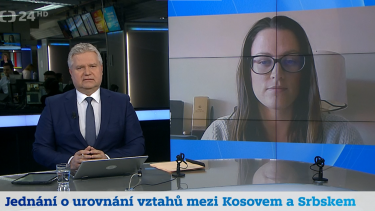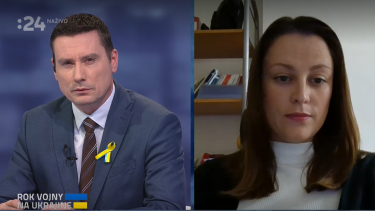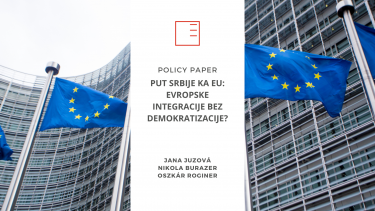ČT24: Negotiations on the settlement of relations between Kosovo and Serbia
Our senior researcher Jana Juzová commented for ČT24 on the opening of negotiations on the agreement between Kosovo and Serbia, which are taking place in Brussels.
Show moreRTVS: Russian aggression in Ukraine
Our senior researcher Jana Juzová commented for RTVS on Ukraine's planned accession to the European Union.
Show morePOLICY PAPER | In search for a more effective EU foreign and security policy: Can Central Europe seize its momentum?
Lucia Rybnikárová writes in her paper on effective EU foreign and security policy about the need to have a strategic vision of the EU to the world and the political will and commitment of the member-states.
Show moreNational Convention on the EU | Background material: Evaluation of the Czech Presidency of the Council of the EU
Our research associate Zuzana Kasáková and our senior researcher Vít Havelka prepared background material for the Round Table of the National Convention on the EU on the topic Evaluation of the Czech Presidency. Three main questions are put to the Round Table: How successful has the Czech Reublic been in implementing its Presidency priorities? How successful was the Czech Republik in carrying out its presidency in terms of organisation? Has the Czech Republic been successful in promoting its membership in the European Union?
Show more

POLICY PAPER | Demand the impossible: How Ukraine became a candidate for EU membership
Tomasz Żornaczuk writes that Russia's aggression in Ukraine has led to major changes in EU enlargement in 2022. The most significant of these was the change in the Union's geographical position after Ukraine and Moldova were granted EU candidate status and Georgia was granted the prospect of accession. The move seemed almost impossible a few weeks before it became the new political reality in June 2022.
Show morePOLICY PAPER | The lingering war in Ukraine: Security implications in Europe
Orsolya Ráczová writes that it is difficult to predict the long-term effects of war with certainty, yet it is essential to be aware of the fact that the longer a war continues, the more dire its long-term impact becomes. The era of relative peace and stability in Europe is over, security should no longer be taken for granted. Europe needs to rethink its security at EU, NATO and Member State level. It is also essential to strike the right balance to ensure security at home while providing much-needed support to Ukraine.
Show moreEU MONITOR | THREE RESPONSES TO DISINFORMATION IN THE EUROPEAN UNION
Disinformation and foreign interference have been concerns in global politics for centuries, but social media algorithms have made the current threat more dire as they amplify content based on human frailties such as our obsession with negativity and outrage. Russian interference in the 2016 US federal election and other elections and referenda in at least twenty countries between November 2016 and April 2019, including the Brexit referendum, the French and German elections, and the Ukrainian power grid cyber-attacks, have highlighted the potential for foreign governments to alter the results of an election or undermine democracies using social media and other means. Writes Jakub Ferenčík in his last EU MONITOR.
Show more PDF
Policy Paper | PUT SRBIJE KA EU: EVROPSKE INTEGRACIJE BEZ DEMOKRATIZACIJE?
Is Serbia succeeding in meeting the conditions for EU accession? Read the Policy Paper co-written by Jana Juzová, Nikola Burazer and Oszkár Roginer on Serbia's path to EU membership. The policy paper is written in Serbian.
Show more PDF
INVITATION | EU-Pacific Talks: Europe and the Indo-Pacific: Trade relations with the Indo-pacific
We would like to invite you to a debate "EU-Pacific Talks: Europe and the Indo-Pacific: Trade relations with the Indo-pacific", which will take place on 21 February at 13:00 online on our Facebook page.
Show more
POLICY PAPER | QMV in CFSP: Impending necessity or resurfacing utopia?
Miroslava Pisklová writes about a discussion on potential broadening of the qualified majority voting (QMV) system to more of the remaining policy areas in the Council of the EU in which it is not yet used, namely the EU´s Common Foreign and Security Policy (CFSP) that has recently gained momentum. This publication aims to analyse the advantages and disadvantages of introduction of the QMV in CFSP of the EU with a focus on the potential impact on smaller member states.
Show moreStaroměstské náměstí 4/1
Prague 1 - Staré Město
110 00
tel.: +420 212 246 552
email: europeum@europeum.org
https://www.europeum.org









